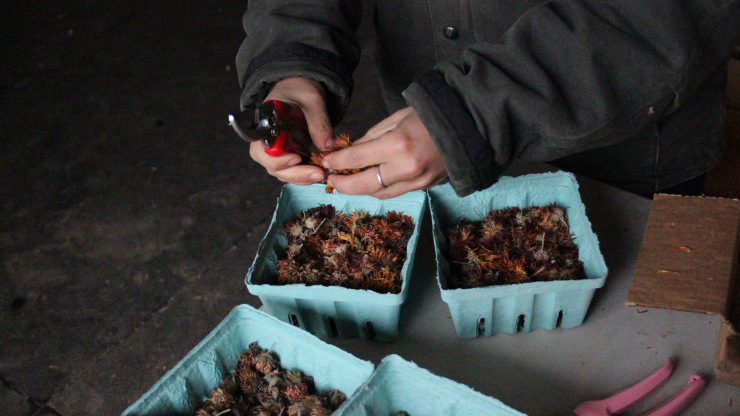Hannah Flood is a young farmer who lives in New York City and works in the Hudson Valley.

Every morning, Hannah Flood, 24, drives up to Linden Farm in Westchester, NY from her apartment in Washington Heights. Flood has been running the farm since the fall of 2016, when it was purchased by WeWork co-founders Adam and Rebekah Neumann. Linden Farm grows vegetables, herbs, and flowers for WeWork employees in the form of a CSA, a Community Supported Agriculture system. The company subsides the CSA shares for their employees, to provide quality produce for healthier employees.

The Neumanns wanted more access to local organic food for their business, which provides communal working spaces for startups and entrepreneurs. “I’ve always thought that people cater CSAs to families a lot,” Flood said and continued, “But I think there’s something to getting more produce to this younger demographic.” Although starting a farm didn’t seem like the ideal job for a young woman, due to the large amount of harsh physical labor the task demanded, Flood convinced Mr. Neumann she was the best person for the job. In the farm’s earlier stages, Flood worked alone. Now, she has three people working under her.

Flood believes WeWork’s initiative can influence other businesses to adopt a similar system, providing easier access to fresh produce in cities and valuing small local farmers. “This is opening the door for so many small farms collaborations with big business,” she said. Another reason for taking the job, Flood says, was to pay off her student loans. Working at Linden, she gets paid a salary, which is rare for farmers.

Growing up in a rural part of Michigan, down the street from a blueberry farm where she worked as a kid, Flood discovered she enjoyed working with food and plants at an early age. She studied Horticulture at Michigan State University, focusing on fruits, vegetables, and ornamental plants. During her freshman year of college, she worked at high school helping students build fences for an urban farm, and that’s when it clicked: “I want to do this farming thing,” she said and continued, “I just committed and went.”

To pay for her tuition, Flood farmed, bartended, managed the university’s compost program, and worked at the university’s organic farm. “I credit that farm for who I am,” Flood said and continued, “It changed my life.” She learned how to drive a tractor from her production manager, how to weld from the maintenance crew, and discovered her passion for flowers. Flood currently works full-time at Linden and has recently opened her own flower arrangement business with her friend Amanda. “It’s such a nice balance to do with farming food because [flowers are] so much less serious,” Flood said and continued, “They’re just there to be beautiful.”

Flood tends to a strip of spinach, one of the few things that grow in harsh cold temperatures. “The best part about farming is that it erases every season,” Flood said and continued, “and you reset and you get to start again.” This ephemeral quality is what she loves most about flowers: they represent the feeling of one moment, and, since they die, that feeling is never corrupted, and the moment is preserved.

This winter has consisted of a lot of building: Flood and the other farmers have built a cooler and a small greenhouse, and they are preparing to build a bigger one, which will take up almost half of the farm’s working field. Meanwhile, Flood keeps busy doing small, indoor tasks, such as sorting through flowers and seeds. Here, she cuts edible flowers, which she will use to make teas and infusions.

Flood, who was once intimidated by the male dominance in the field, hopes to one day work in an environment where women farmers can learn from one another and focus on how to make tools and equipment better for women. “We need representation in this field,” she said and continued, “We need people saying, ‘straight, six-foot-tall white men are not the majority anymore.’”
Flood claims she got her “farmer-dash-entrepreneur” gene from her mother, a great cook who is confident she will get her “big break” from one of her many ideas. Right now, Flood’s focus is figuring out a better system for the CSA, so that WeWork can scale the initiative and provide for more offices.








